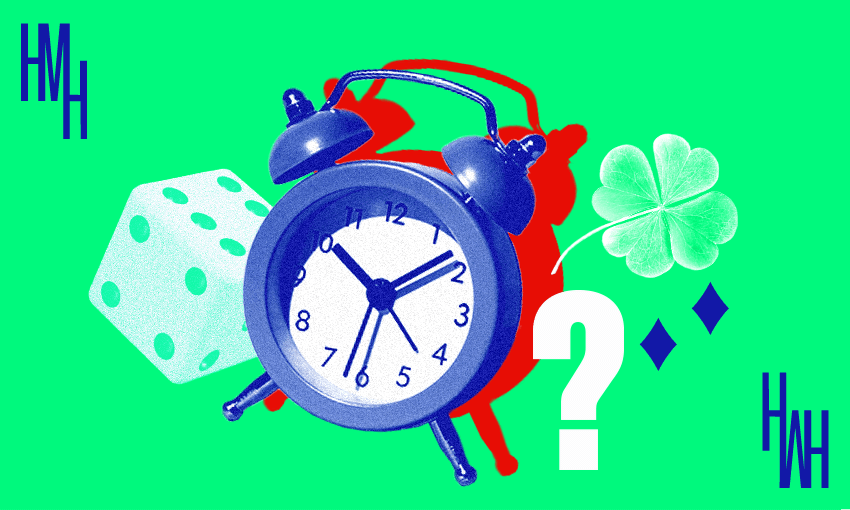This week, Hera Lindsay Bird ponders whether it’s better to leave a party too early or too late.
Want Hera’s help? Email your problem to helpme@thespinoff.co.nz
Dear Hera,
How can you tell when something is over?
A recurring theme through my life is sticking around way past the due date. There have been the relationships, sure, literally all of them, but it’s not just that. I’ve clung to jobs that were terrible, too. For the life of me, I just can’t tell when something should end vs being something I should overcome and work through.
From what I can tell, I’m driven by the desire to be completely sure I’m making the right decision. However, by the time that clarity has arisen, I’ve been busy doing damage to myself in the process.
Help me Hera, I wish I knew how to quit [anything].
Sincerely,
Over It
Dear Over it,
I’m sympathetic to your question, because I too am a heel-dragger. But you raise an interesting philosophical question: Is it better to leave a party early or late?
Leave late and you’re witness to the humiliating downfall of a once-great civilisation. The melancholy stacking of chairs. The drunk cousins brawling in the rotunda.
Leave early, and deal with the arguably greater speculative regret of not knowing how things might have gone. Studies show we usually regret inaction more than action, and irreversible decisions even less.
But the choice boils down to: What sort of regret would you prefer to be haunted by?
Regrets aren’t even a bad thing. Without regrets you’ll never be able to stand pensively at the window, staring out at the ocean with the inscrutable melancholy of a retired sea captain. It’s handsome to have regrets. It’s also, allegedly, character-building. If Dorothea hadn’t married Casaubon, would her overzealous youthful piety and thirst for self-mortification have become the very whetstone on which the fine and generous blade of her soul was sharpened?
Every action carries with it its own corresponding set of vanquished futures. Or to paraphrase Kirkegaard, don’t worry, it’s probably all bad.
You write to me with the professional weariness of famed Belgian investigator Hercule Poirot, after one too many international jewel smuggling cases. You are searching for the maximum amount of data in order to make the most psychologically correct decision. The trouble is, you can’t solve the great existential questions of your life as easily as the murder of a elderly patriarch in a small seaside village.
In emotional situations, there’s never enough information. Having a surplus of information isn’t even good for us. We should never have invented calculus. It can’t be healthy to have so many loose numbers floating around the brain. When it comes to God, romantic love or quantum physics, some things are simply none of our business.
I sympathise with your plight, because I’m also a person who wants the most information possible. In the death throes of some bygone relationship, I remember discussing a similar problem with a friend. They asked how much information it would take to satisfy my doubt on a particular issue. But doubt is never really satisfied. I think information gathering is usually a talisman against future worry. So we must fashion ourselves a small, restorative liqueur, wax our luxuriant moustaches and ask ourselves: worry about what?
Maybe, in these situations, you already know what you need to do, but cowardice has settled upon your soul like idle mists on stagnant waters, and you’re using moral indecision as a form of emotional procrastination in order to put off the excruciating task of having to tell someone how you feel.
Maybe the particulars of the situation are so subtle and complex you’ve become cognitively paralysed by the emotional nuance, like a dog at a U2 concert.
Maybe you don’t trust your intuition, because your heart is constantly sending off contradictory warning signals, like an ice cream truck with an ambulance siren.
Maybe you’re using information-gathering as a way of absenting yourself from being emotionally present – and by perpetually idling in deliberation mode, you can trick yourself into thinking you’re working constructively towards a solution, when really you have one foot out the door, ready to run at a moment’s notice.
Maybe you just love worrying, and do it for fun. I don’t know, I’m not a brain doctor.
The stock advice for someone who struggles to make decisions would be: talk to a friend or professional, make a pro/con list, buy a magic eight ball. But if you constantly find yourself involved in endurance-based feats of emotional research, it’s worth considering whether the process of investigating better methods of investigation is helpful, or whether it’s just another way of curating more data with which to torment yourself.
So how to switch off your inner detective and trust the evidence of your own heart?
I too would like to know. Maybe it has to do with experience. Or taking a leap of faith.
But for now, give yourself a break. Lingering isn’t the worst trait in the world. There are plenty of instances where it’s advantageous not to be a quitter. It shows you have stamina and patience. But when applied to the wrong areas of your life, it’s also exhausting. Maybe it’s time to put down the magnifying glass, move to the countryside, and cultivate some geometrically beautiful marrows.
Want Hera’s help? Email your problem to helpme@thespinoff.co.nz
